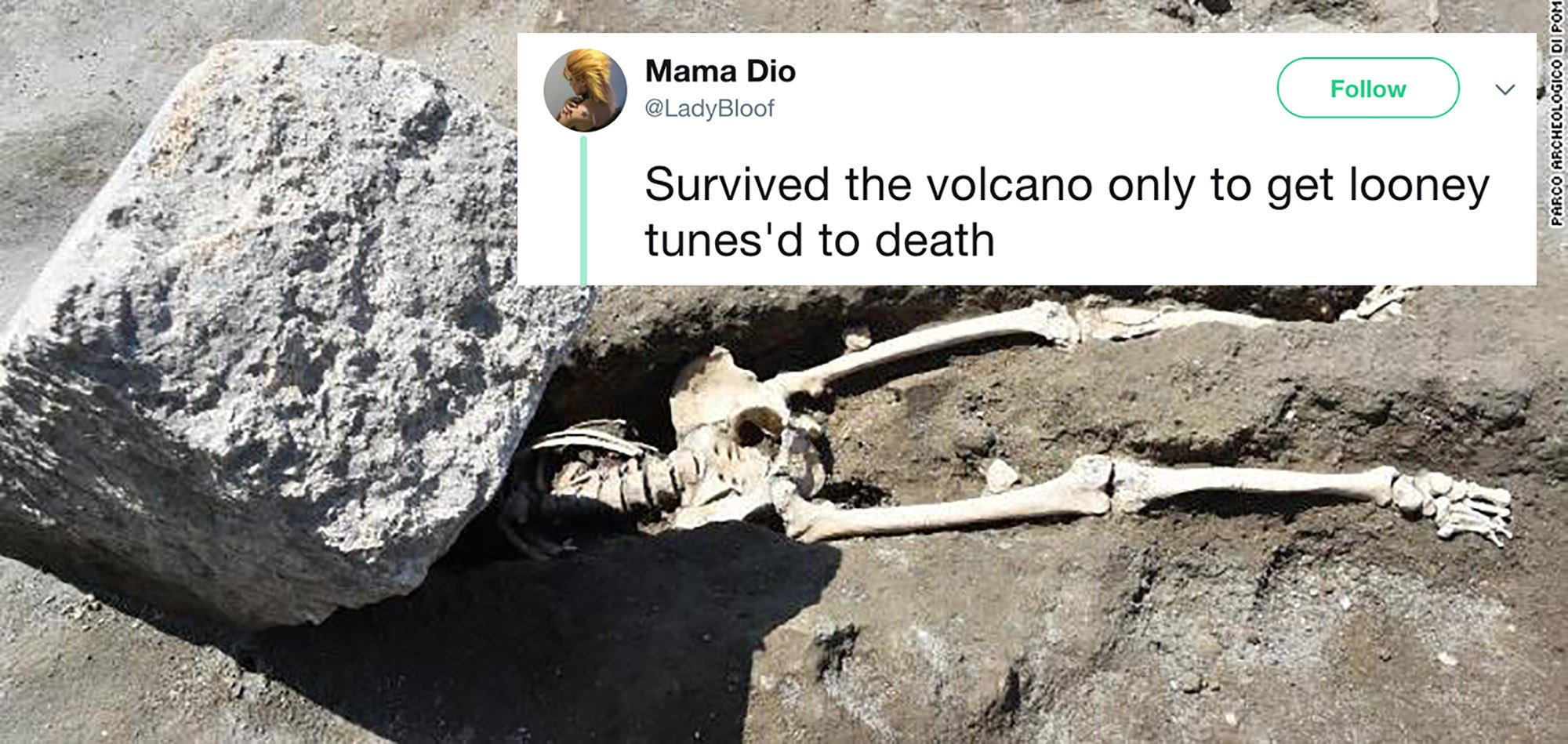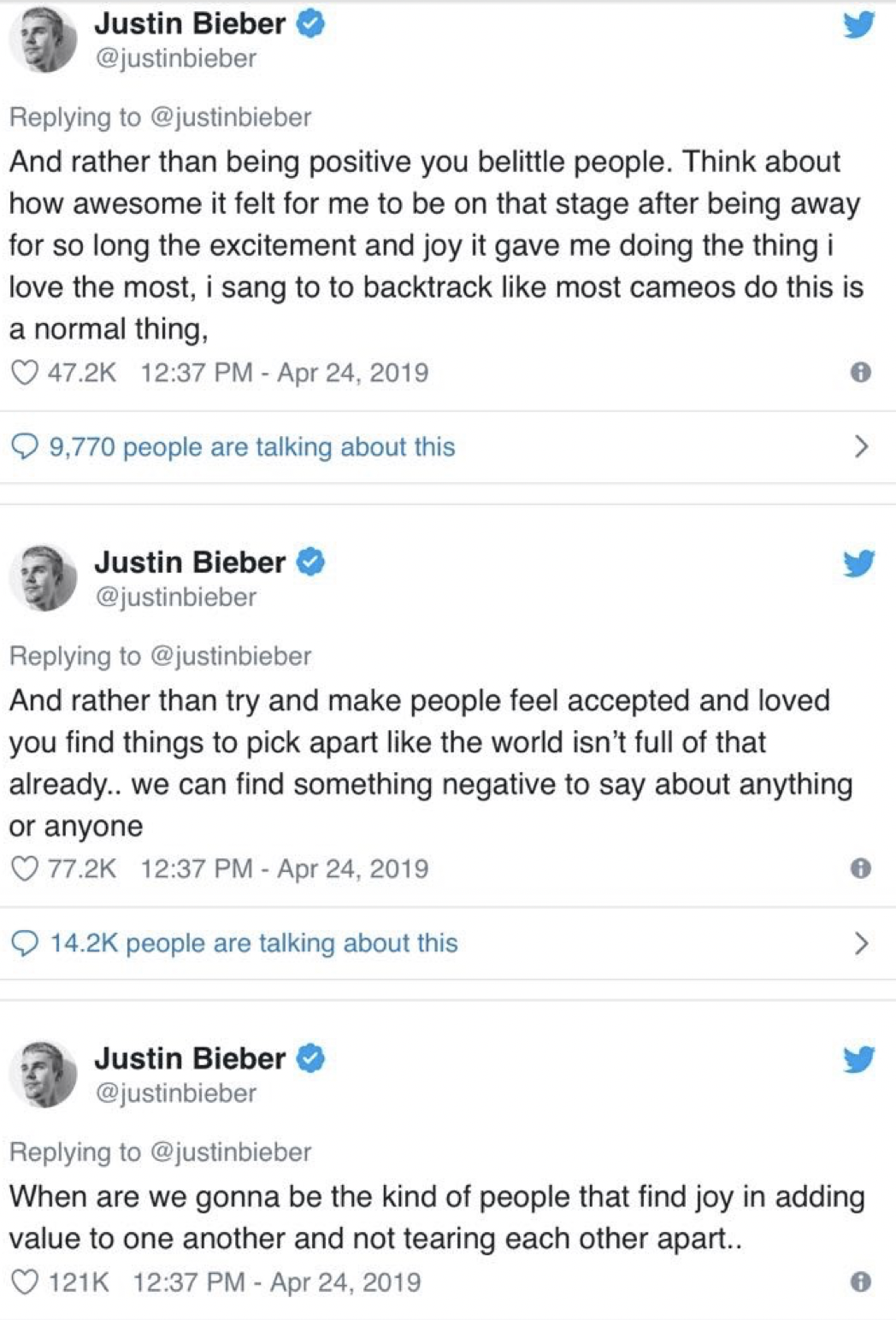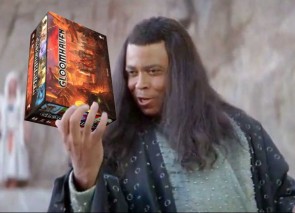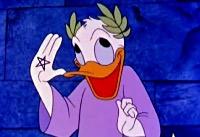Most board games are mediocre. This shouldn’t be controversial: most books are mediocre. Most movies too. Culture is a lot like the universe it tries to give meaning to, which is to say a mess, when it is anything at all (and it’s mostly nothing, or communities of nothing that amount to, in their patterning… something). A recent thread here on the “Golden Age” of board gaming has us wondering if the medium is in decline, and whether or not what we thought was gold was only ever wood-product with gold paint smeared on it.
Every medium of culture invites these anxious conversations about the past. “Weren’t movies better in the 70s?” says the lover of Coppola and De Palma, celluloid grain and disco. “What’s better than The Shawshank Redemption?” says the man in his dorm room beneath posters of the old gods: The Boondock Saints, Bob Marley, The Wolf of Wall Street DiCaprio (Tiger Beat DiCaprio would cancel him out, if he and Tiger Beat were remembered). This nostalgia is naturally self-serving; the nostalgic person uses their knowledge of the past to declare themselves superior to the present, bound though they mercilessly are to the present. Brann in Game of Thrones is nostalgia taken to its most tedious and artificial ends, the conflation of knowledge for a personality; Brann of all people should know better that knowing doesn’t, by itself, make you a person worth knowing.
Did the medium peak with chess? I’ve already written about how Gloomhaven probably isn’t the best board game of all time, and, if you took seriously the word of Gloomhaven fans on Reddit, you’d already know that I was “pretentious”, an “idiot”, a bad writer and teacher, a worse carrier of history, a defective Brann. Questioning what’s popular is always bound to run you into trouble.
This past week, the Met Gala celebrated Susan Sontag’s famous essay “Notes on Camp” by theming their red carpet event “Camp: Notes on Fashion.” Most of the outfits on display were mediocre, pale imitations of the camp sensibility. Sontag defines camp as follows: “Camp is a certain mode of aestheticism. It is one way of seeing the world as an aesthetic phenomenon.”
I can’t help but think that what is missing from so much criticism (and, more broadly, fan appreciation) of board games is the willingness, which is the same as a heely vulnerability, to see the world as that “aesthetic phenomenon”. Games, the thinking goes, should be fun first, artful…later. But aesthetics brings to the table questions of beauty, artifice, and taste, about which Sontag has this to say: “Most people […] allow that considerations of taste play a part in their reactions to people and to works of art. But this attitude is naïve. And even worse. To patronize the faculty of taste is to patronize oneself. For taste governs every free -- as opposed to rote -- human response. Nothing is more decisive. There is taste in people, visual taste, taste in emotion - and there is taste in acts, taste in morality. Intelligence, as well, is really a kind of taste: taste in ideas. (One of the facts to be reckoned with is that taste tends to develop very unevenly. It's rare that the same person has good visual taste and good taste in people and taste in ideas.)” Or, as the Dude says, speaking for those of us with heavier tongues than Sontag: “Yeah, well, you know, uh, that’s just, like, your opinion, man.”
There is a taste in fun, then, that brings aesthetics back to our game tables. And interrogating that taste in fun seems worthwhile, even if it leads to uncomfortable questions and blinking, sputtery answers.
I’m aware that invoking Sontag and the Dude have already doomed me and this essay to failure. So it goes. And my aim here is messy—to think about board games as play and art, as pieces of culture that reflect that culture, as good, bad, and mediocre, as wastes of time that lay waste to time. I am aimless, which is probably appropriate for writing about games. What better technology do we have besides games to save us from our aimlessness?
These notes are also for Oscar Wilde.
“We can forgive a man for making a useful thing as long as he does not admire it. The only excuse for making a useless thing is that one admires it intensely.” —Oscar Wilde preface to The Picture of Dorian Gray
- To start, games are structural. They groan with the structural weight of themselves the way buildings do in the wind, ships on the waves, books in hands.
- Avoiding the cracks in a sidewalk because they’ll break your mother’s back is a game because it’s structural; its boundaries do not trespass space and time. It isn’t a good game, necessarily, but the structural backbone, in both game and mother, directs the player to perform a set of limited actions. Failure is possible, as is deviance: the player who willfully breaks the rules is a pervert (and a murderer, in the case of mother).
- The pervert tends to avoid games even as they make a game out of their relationship with reality—the rules don’t apply to perverts, except for one: all rules deserve to be broken.
- Though we play games for many reasons—to teach, to socialize, to have fun—the underlying reason we play games has to do with our fear of death, destruction, the welter and the waste. Play is really an act of resistance to the natural order of the universe, which is disorder. If you can read these rules, you are not dead. Not yet.
- And if the player does die, as some games like Risk allow, it is a table-flipping event. Who can blame the player, who is really alive, who proves his life by destroying the game? Well, we can blame him for killing the rest of us, momentarily, so that he might live.
- The White Tiles Are Lava and the Black Tiles Are Land is also a game. It isn’t a good game, necessarily, but it tells us what games are: arbitrary systems of laws, imposed by arbitrary authorities, with arbitrary rewards for following the laws, and punishments for breaking them.
- The White Tiles Are Lava and the Black Tiles are Land tells us what games also are: metaphors for life and death, the struggle to survive, often at the expense of someone else’s perishing.
- If games are metaphorical, that means games tell stories.
- All games tell stories. This is because games are played by creatures who can only make sense of the world, and of games, through story. Even abstract games, like Set, tell stories. Set tells the story of shapes learning they aren’t shapeless, colors learning they’re not alone, patterns telling chaos to fuck off.
- Go tells the story of conquest, territorial control, the very fine balance of the natural and unnatural worlds.
- Chess is the YAS QUEEN of the ancient world.
- Chess is also the story of how a slug of a man who can’t even stand to look directly at his enemies still gets to be the king. It is endlessly modern in this regard.
- Chutes and Ladders tells the story of how some technologies bring us panting closer to god, while others send us squealing toward hell.
- A storyless game isn’t possible because games are the byproduct of the oldest human story: building against the welter, and waste, and darkness.
- Games tend to foreground their laws and background their stories—they are practically biblical in this regard.
- The laws of games are also known as mechanics, and we will get to mechanics, but I want to talk first more generally about laws.
- Laws aren’t synonymous with morals, though they depend on an underlying structure of moralism that can be, itself, right or wrong or right in places and wrong in places, majority-right or majority-wrong.
- In Leviticus, God speaks to Moses, saying: “And with a male you shall not lie as one lies with a woman. It is an abhorrence.”1 God doesn’t explain why homosexual sex is “abhorrent” in the moment, like a gamer slurring through the patchily written rules of a Fantasy Flight game. You can try to rationalize the rule, since the Israelites make a lot over “wasted seed” that doesn’t end in fertilization, but then again, nothing is said in the Bible about lesbianism, though Canaan wasn’t too far from Lesbos, where Sappho was plucking hyacinths out of the hair of shepherd boys and giving them to women she wanted to fuck.
- Laws are often badly justified because the underlying structure of moralism that supports them is badly justified.
- Bad laws often reveal a bad underlying structure of moralism, all the rotten apples that have fallen from a Bad Tree of Knowledge.
- History spills with rotten apples; the future will spill with them too. This is the eternal recurrence Nietzsche and his greatest shill, Conan the Barbarian, talk about, and we are doomed to repeat ourselves if even our games repeat our moral failures.
- Game mechanics, which are their own arbitrary laws, most often reveal an underlying structure of amoralism for their designers, who so rarely think about rights and wrongs that do not apply to the lusciously oiled moving parts of their machine-structures.
- Moral games exist in spite of designers. This is because games are (mostly) played by creatures with an intrinsic moral sense who, in spite of themselves, can’t help but bring that moral sense to the table.
- When the computer Deep Blue beat Kasparov in 1997, it was a victory for mechanics/laws, and a failure for humanity/morality.
- Many gamers are not interested in moral games because immoral games offer easier, less social forms of entertainment that don’t try to answer this problem of how we all live together with minimal suffering.
- Red Dead Redemption 2 is a violent, immoral game because one of its primary mechanics for engaging the world is the headshot. The player cannot progress further in the story of the game without shooting. Imagine if Tolstoy had called that one book of his War & War2—that’s Red Dead Redemption 2.
- From a moral standpoint, shooting the head of a digital creature isn’t the same as shooting the head of a biological creature, but our time is finite, and, given the finite amount of activities we will ever get to do, we might hope that we helped real, biological others more, in the aggregate, than we shot the heads of digital chimeras.
- François Truffaut said of war films that to depict war was to “ennoble it”. Truffaut was concerned that celluloid sexes up suffering; the distance of fiction, the directorial mediation, the acting and special effects—an actor holding synthetic bowels slicked in slime, screaming, moves us on our couch, but we’re couched in comfort. What can we do when no one is really suffering, and we’re so far away?
- Responding to controversies swirling around Zero Dark Thirty’s false depiction of how torture led to the capture of Osama Bin Laden, Kathryn Bigelow said that “to depict events is not the same as endorsing them.”3
- Bad history, bad fiction, bad games invite bad readers, bad players, bad actors. Trump can claim that torture is effective, why, it got us Bin Laden—even liberal Hollywood made a movie about it! Rockstar can claim that Native Americans and African Americans hold no animus toward white men the likes of John Marston, those head-shootin’ rascals—he helped us complete the American Fathers Quest!
- My students often cite Saving Private Ryan as one of their favorite films but do not know what country Normandy is in. Their ignorance isn’t the film’s fault—the film’s fault is that bloody excitement will always trump restrained disquisition. Few teenagers would show up to the film version of W.G. Sebald’s Austerlitz with tubs of popcorn.
- The quality of the food we eat while watching these movies and playing these games isn’t a coincidence—junk excuses junk.
- Gloomhaven is a violent, immoral game because one of its primary mechanics is the annihilation of an Enemy. You do not play a game like Gloomhaven to simulate the complex channels of peace negotiation, of Cohabitation with Conscious Others. You play it to kill, to get a sweet new dagger that kills better.
- Games that feature politics, alliances, alternatives to annihilation—these are the beginnings of an underlying system of moralism.
- Dune, Twilight Imperium, and Diplomacy allow players to do some things that are intrinsically good and right, though they are still, at heart, variations on a theme, and that theme is dominance.
- Dominance has many names: the winner, the king, the father, the point-leader, the first player, the first across the finish line, the Alpha and the Omega, God, the LORD who “says, saying”, in case you weren’t sure He was talking.
- Dominance is never enough, least of all for itself—when he is asked what’s best in life, Conan, seated higher than the rest of the sweaty men at the feasting table, says, “To crush your enemies, to see them driven before you, and to hear the lamentation of their women.”
- Winning somehow tastes sweeter if the losers are left in a state of sensual suffering. Inis, a game of territorial conflict, articulates this in a devious, cunning way by encouraging players not to wipe their opponents from the map: rather than obliterate, you stand on your opponents’ necks.
- Inis is, by the way, an amoral game that leans immoral. I love it, in the same dubious spirit that I love Conan.
- Thulsa Doom, Conan’s arch enemy in the gloriously immoral movie, is also obsessed with dominance, but he cultivates it through a cultic following; he gives up steel for speech, politics. He is the Mitch McConnell of Hyboria, a realpolitiks-spewing manipulator who has no underlying system of moralism. He acts for himself, and the cult acts for him. He is also a snake, which goes to show that you can take the man out of the Garden of Eden, but you can’t take the Garden of Eden out of the man.
- I don’t know if I should have to gloss on my love for the Conan movie, but I will: we can and often do love culture that is immoral. We can only hope there are better works of culture that we love too.
- Games generally present dominance as a simple binary: steel or speech, annihilation or conversion.
- Most adult games are centered around dominance because most adult games have not climbed up the stairs from the basement realms that ennoble the likes of Conan.
- That stereotype of the gamer—the basement dweller—isn’t so offensive as to be meaningless. The basement is an architectural metaphor here, since it is both foundational and windowless; it insists on a space for itself absent a social awareness of the world beyond.
- On the other hand, children's games often foreground what’s good and what’s right—sharing, cooperating, listening, words that feel so baldly sincere and pat that I winced typing them. My wincing is a sign of cultural conditioning: inherent goods embarrass us because our culture leans lawfully evil.
- We should at least question a medium where children have access to more moral material than the adults who watch over them.
- Cooperative games like Hanabi and Shipwreck Arcana are children’s games, standing on top the shoulders of each other, disguised in their trench coats.
- I said I wanted to talk about mechanics first, and I did, but what does that leave us? What are games about? Story—remember, games tell stories.
- Many stories should never be turned into games. We understand that some suffering is too great, too unknowable, to force into the rigid structure of a game. In this understanding, we gamers are perhaps more in the right than cinema. What games dare go into the gas chambers of Auschwitz the same way Spielberg’s cameras do?
- Of Spielberg’s film Schindler’s List, Stanley Kubrick had this to say: “Think that's about the Holocaust? That was about success, wasn't it? The Holocaust is about 6 million people who get killed. Schindler's List is about 600 who don't."
- The director Jean-Luc Godard accused Spielberg of profiting off suffering while Schindler’s widow, Emilie Schindler, lived in poverty in Argentina. The intersections of commerce and art, capitalism and morality, always lead to these dreary conversations: suffering, it seems, demands an account but not a ledger.
- (We shouldn’t trust the likes of Godard who mistreat the likes of Agnes Varda.)
- And yet we still do it—we still make games out of stories that should not be games. The “should” here isn’t technical; of course we “can” make these games. The “should” here is moral, asking: is it right to make a game or is it wrong to make a game?
- GMT’s Gandhi, made by a white man who isn’t Indian, aims to turn the history of Indian independence from the British into a game. Why do gamers want to make play out of real history?
- I imagine there are many gamers who will play Gandhi as not only a vehicle for entertainment but also as a vehicle for understanding history. But History as Entertainment strikes me as morally dubious. History, I think, should be treated with the reverence and awe, the fear and the trembling that attends the churchgoer; but unlike church, disbelief, and a debilitating lack of faith in a singular Truth, are the holiest of holies in history.
- Consider how people made a meme out of the death of the Pompei person, crushed by a stone in the Mt. Vesuvius eruption:

- History as Entertainment takes someone’s worst day and turns it into someone else’s half-assed tweet.
- Defenders of History as Entertainment will say, in a contract of sorts, that people two thousand years from now have permission to laugh at our suffering, too, but we should be skeptical of the idea that suffering transubstantiates to hilarity the way wine transubstantiates to blood. We should also be skeptical about contracts that don't pay out for thousands of years, since Scientology does the same thing.
- The old formula goes: Comedy = Tragedy + Time. I imagine we can make a similar formulation for historical games.
- Tragedy + Time? ⇒ Make That Historical Game!
- But I’m not sure any of us can agree on the value of time here; and how do we account for the culling of different perspectives good history requires? And who gets to set the boundaries of the tragedy—those who directly experienced the trauma? The second and third generational inheritors of that trauma? Or the calmly observant outsiders who conflate their tears, borne from empathy, to be about the same as, or close enough to, the tears of the victims? But crying during Schindler’s List isn’t an education in suffering what the Nazi’s victims suffered. We forget this because good storytellers like Spielberg overwhelm us to blubbering ecstatics—but real trauma begs for a word bigger and seaworthier than overwhelm. As Roy Schneider says in another Spielberg film: “You’re gonna need a bigger boat.”
- The board game medium is dominated by white, male, American and European designers and players. We shouldn’t be surprised that whiteness and maleness is centered in board gaming, and that forays into the stories of others set off all the theorist alarm bells that could wake the Edward Saids and Sontags and Foucaults in their cold crypts.
- But media consumers, and gamers certainly, are selective about their hearing—the bell tolls for some games and not for others.
- Where is the 9/11 game with a United 93 Resistance Track? If the question offends you, then you must believe the hard threshold exists between an acceptable game and an unacceptable game. If Gandhi feels acceptable to you, might it be because you have little emotional or cultural attachment to the man and his struggles besides a puny historical “interest”? And that this fun takes place in a country and in a history far enough from your own?
- Gandhi was assassinated in 1948, but he lives on as a “leader token” in GMT’s Gandhi. We’ve tokenized him quite literally.
- Where is GMT’s AIDS? One player plays as ACT UP, the other as the Reagan/Bush administrations. Reagan/Bush wins if the It's a Homosexual Disease Track reaches 10.
- We won’t have to dread the arrival of GMT’s AIDS because, like whiteness and maleness, the board gaming medium predominantly centers heterosexuality. Straight men care about war and resistance when it centers around other straight men, when the warring is bloody but not about blood.
- And while we’re talking about history, we need to think about how we handle something even more elemental—story, real or not. The toolbox we have to interpret stories is so much heavier than the toolbox we have to interpret games.
- Stories are infinitely interpretable, and we’ve devoted thousands of years to making bigger infinities out of those interpretations. We were once so good at this form of interpretation that we have a name for it: cultural literacy.
- And those people who made cultural literacy a life’s pursuit were once called critics.
- Civilization needs critics as much as it needs water, food, shelter, infrastructure, and pornography.
- And yet criticism is losing. We are in the middle of the Trump presidency, so this might be inevitable: close-reading the failures of this presidency has only made Trumpism stronger, more immune to critique. And the critical thinking skills we once thought would save us have been co-opted by conservatism: the post-modernist dismantling of certainty and authorship, cultivated in academia, has led us, in a torturous red line, to “Fake News”. Roland Barthes could never have anticipated “The Death of the Author” would be used to misread the Mueller Report.
- Board gaming is a tiny medium in comparison to movies, video games, even books and newspapers. When rumors spread that the most prominent critics in the medium receive payment from designers and publishers, we shrug or we moan. Then we roll those goddamn dice. Do we really expect The New York Times to report on $2000 payments to The Dice Tower for running previews of games? The controversy is so small it begs a smaller word than small, a smaller boat.
- Similarly, Shut Up And Sit Down ran into trouble with their recent review of Blood on the Clocktower, a game that doesn’t even physically exist, outside a few circulating prototypes. Gamers were concerned that SUSD violated their long-standing practice of not reviewing Kickstarter projects before distribution. How was SUSD’s behavior different, these gamers wanted to know, from, say, a Magic Bullet Infomercial? Besides the breathlessly excited Britishness?
- Critics have always existed in that quivering, liminal space between consumers and producers. Sometimes the critics were the defending ramparts, and sometimes they were the battering rams. Consumers belong inside the protective walls of the city in this metaphor (as do vulnerable producers and artists—monopolies like Disney can go fuck themselves in the shrubs). The rise of Kickstarter in board gaming has made consumers the desperate knockers at the gate, howling to be let in before the invading hordes arrive. Except…the invading hordes are also the consumers, since they now fund the producers, and the horde banners say: THESE SWEET SWORDS YOU BOUGHT US LOVE YOU MOST WHEN THEY SMASH YOU! Should we expect a medium’s criticism to thrive when the only ones assuming risk are that medium’s fans?
- Risk is missing in games—risk on the part of the producers, who must understand that all art (and games are art) runs the risk of not satisfying all or any tastes; risk on the part of critics, who must understand that criticism shouldn’t be about protecting fans from their own unwillingness, which is the same as an invulnerability, to interrogate culture; risk beyond financials on the part of fans, who must also risk being vulnerable to each other and especially themselves, to recognizing the bitter truth that not all tastes are sweet.
- Fans claim they want “honest” and “ethical” criticism, but they are bloviating: a fan is someone who already made up their mind long ago and arrives to criticism to see their mind echoed.
- In the 90s, Siskel and Ebert’s thumbs really could thumb the market one way or another, a power we no longer associate with criticism. The forms of the critics long ago rotted on the rampart spikes.
- These past few weeks, a wave of celebrities, from Ariana Grande to Justin Bieber and Olivia Munn, could be found attacking “bloggers” and critics for negativity. So what if Justin Bieber lip-synced at Coachella, you motherfucker?

- Bieber isn’t unique in his privileging of “joy” and “positivity” and his dismissal of criticism as an intrinsically negative discourse. Fans peddle the same tired thinking.
- A fan is a critic who’s gone mad with love. Fans often fail to recognize that critics are capable of love, and certainly positivity, and that they, critics, want to be mad from love too—except everything mostly sucks, and things mostly sucking keeps the critic’s madness from spiraling.
- We might do well to remember that: the critic wants to love, is so capable of loving enormously.
1 Excerpted from The Hebrew Bible: A Translation with Commentary by Robert Alter
2 The Hungarian writer László Krasznahorkai’s War and War is, incidentally, a true work of art.
3 https://www.telegraph.co.uk/culture/film/9809355/Kathryn-Bigelow-interview-for-Zero-Dark-Thirty-The-director-on-the-trail-of-terrorism.html
 Games
Games How to resolve AdBlock issue?
How to resolve AdBlock issue? 



























